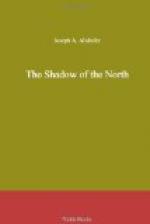St. Luc sat very still, apparently absorbed in the great race which would soon be run. In an ordinary time any stranger in Williamsburg would have been noticed, but this was far from being an ordinary time. The little town overflowed with British troops, and American visitors known and unknown. Tayoga or Willet, if they saw him, might recognize him, although Robert was not sure, but they, too, might keep silent.
For a little while, he wondered why St. Luc had come to the Virginia capital, a journey so full of danger for him. Was he following him? Was it because of some tie between them? Or was it because St. Luc was now spying upon the Anglo-American preparations? He understood to the full the romantic and adventurous nature of the Frenchman, and knew that he would dare anything. Then he had a consuming desire for the eyes of St. Luc to meet his, and he bent upon him a gaze so long, and of such concentration, that at last the chevalier looked up.
St. Luc showed recognition, but in a moment or two he looked away. Robert also turned his eyes in another direction, lest Tayoga or Willet should follow his gaze, and when he glanced back again in a minute or two St. Luc was gone. His roving eyes, traveling over the crowd once more, could not find him, and he was glad. He believed now that St. Luc had come to Williamsburg to discover the size and preparations of the American force and its plan, and Robert felt that he must have him seized if he could. He would be wanting in his patriotism and duty if he failed to do so. He must sink all his liking for St. Luc, and make every effort to secure his capture.
But there was a sudden murmur that grew into a deep hum of expectation, punctuated now and then by shouts: “Blenheim!” “Cressy!” “Cabell!” “Stuart!” Horses and horsemen alike seemed to have their partisans in about equal numbers. Ladies rose to their feet, and waved bright fans, and men gave suggestions to those on whom they had laid their money.
The race, for a space, crowded St. Luc wholly out of Robert’s mind. Stuart and Cabell, each dressed very neatly in jockey attire, came out and mounted their horses, which the grooms had been leading back and forth. The three year olds, excited by the noise and multitude of faces, leaped and strained at their bits. Robert did not know much of races, but it seemed to him that there was little to choose between either horses or riders.
The circular track was a mile in length, and they would round it twice, start and finish alike being made directly in front of the judges’ stand. The starter, a tall Virginian, finally brought the horses to the line, neck and neck, and they were away. The whole crowd rose to its feet and shouted approval as they flashed past. Blenheim was a bay and Cressy was a sorrel, and when they began to turn the curve in the distance Robert saw that bay and sorrel were still neck and neck. Then he saw them far across the field, and neither yet had the advantage.




